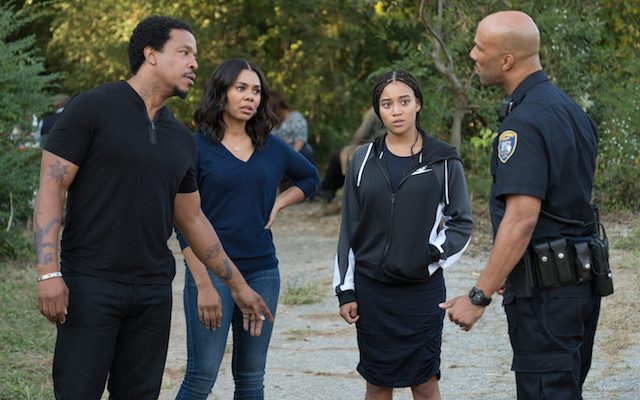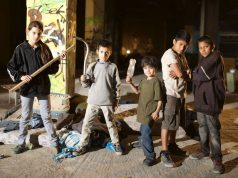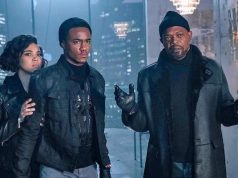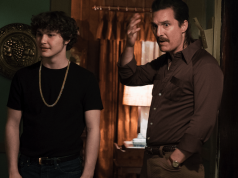
It takes its time getting there, but you know “The Hate U Give” is going to turn serious on us because it starts with our narrator, 16-year-old Starr Carter (Amandla Stenberg), telling us about the time when she was 9 and her dad gave her The Talk — not the sex talk, but the one black parents give their children to help them avoid being shot by police during routine traffic stops.
From then until her own run-in, Starr has a tranquil if complicated life, living with her parents (Regina Hall and Russell Hornsby) and siblings in the bad part of town while attending a fancy, mostly white private school in a nice neighborhood. At school, she does everything she can not to give anyone a reason to think of her as “ghetto,” which means tamping down her use of black slang or other cultural signals. She has a white boyfriend, Chris (K.J. Apa), who’s never been to her house. On the weekends, she hangs out with her neighborhood friends but conscientiously avoids getting into the drug- and gun-related problems many of them have. Starr’s father used to be one of them, working for local drug kingpin King (Anthony Mackie) before going straight. (King’s gang is called the King Lords, which doesn’t speak well for his creativity.)
After much exposition — it’s based on a novel (by Angie Thomas), and it has a novel’s languid pace — the story arrives at the inciting incident when Starr’s friend Khalil (Algee Smith) is pulled over by police and ends up shot dead, with Starr in the passenger seat. Khalil’s behavior during the traffic stop — not taking the situation seriously, assuming it’ll be fine because he didn’t do anything wrong, not standing where the cop tells him to stand — is almost comically reckless, as if he has no idea that young men like him get killed all the time in situations exactly like this — like it’s his first day being black. That lapse in credibility is symptomatic; the film, directed by George Tillman Jr. (“Soul Food,” “Notorious,” “Faster”) from a screenplay adaptation by Audrey Wells (“Under the Tuscan Sun”), is often didactic and two-dimensional, coming across like a Black Lives Matter “Afterschool Special,” albeit an especially heartfelt one. There isn’t a lot of nuance or complexity here.
The rest of the film is about the aftermath of Khalil’s death, including Starr’s struggle over whether she should become an outspoken activist or keep maintaining a low profile. Her school friends know the shooting happened in her neighborhood but not that she knew the victim, and she’d like to keep School Starr separate from Home Starr as long as she can. (Rest assured, one of the film’s messages is that living a double life is unhealthy.) The incident becomes a rallying point, the funeral evolving into a march on city hall to demand that the cop be held responsible (fat chance, of course). Starr’s whitest, blondest friend, Hailey (Sabrina Carpenter), plays the “cops’ lives matter too” card, with expected results. Starr has an uncle named Carlos (Common) who is a police officer and can provide the perspective of a black cop, but the movie’s heart isn’t in it and Common seems embarrassed.
Working in the movie’s favor is the winning lead performance by Amandla Stenberg, the bright talent who played Rue in “The Hunger Games” and has been starring in so-so adaptations of YA novels (“Everything, Everything,” “The Darkest Minds”) ever since. “The Hate U Give,” the title of which comes from a Tupac Shakur song, is her best yet, showcasing her down-to-earth charisma and natural sincerity. A strong cast (except for Common) supports her, and the movie is further elevated by its wholesome family dynamics and inspiring depictions of righteous activism. She was given the name Starr to remind her to be a light in the darkness, and the film’s focus on channeling one’s anger into productive action gives it a matching sense of optimism, even if the story is too glossy and pat to be wholly effective.
B- (2 hrs., 13 min.; )





